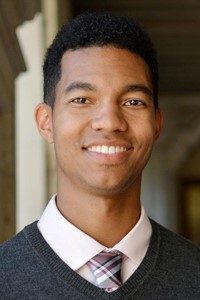We’re continuing our “On the Market” series featuring UT Austin graduate students who are on the job market! Up next is Corey McZeal, a 6th year doctoral candidate and Urban Ethnography Lab Graduate Fellow:

Tell us about your research. What are you working on?
My dissertation is a study of people who provide unpaid care for their family members. Most of them are caregivers of elderly people, and the majority of the care recipients have dementia or some other cognitive impairment. Half of my research involved volunteering at an adult day center (ADC) for 18 months. This facility serves the same basic function as a day care for children does, but it’s for adults with early memory loss. Whichever family members the care recipient lives with brings them to the ADC in the morning and picks them up in the evening, allowing that person to work or take a break from the care process. The other half of my research involves in-depth interviews with 20 caregivers. About half of these individuals utilize the ADC I volunteered with.
How did you prepare for the process of going on the market (preparing materials, selecting the right job openings, sending out applications, etc.)?
There was a writing group over the summer for all of us who were going on the market, and that really helped me get my materials finished early. After that, I already had a strong framework of the materials that I would need for every job. As far as selecting the right job openings, I mostly filtered everything by research area. I considered any job posting I found with a family or health-related focus.
How are you balancing all of your responsibilities this semester?
I’ve gotten much more organized since I started using a calendar. Setting deadlines for myself is imperative, because once you get to this stage of grad school everything is up to you. Sure, your committee will guide you, but you have more freedom than at any other time in grad school. On one hand it’s a great thing because you’re only spending time on things you (hopefully) enjoy and you can organize your time any way you see fit, but if you lose focus or motivation, there isn’t as much structure to keep you on track. It’s not like early on when you have classes and a syllabus that outlines your semester, so you have to do all of that yourself and then stick to it.
What is the highlight experience of your research during your time at UT?
Interacting with the members of the ADC was great. I learned so much about everyone there over the course of 18 months. The staff was great and helped me in any way that they could, but building rapport with the members was especially rewarding. Since they’re all in various states of cognitive decline, it took a long time for them to consistently remember who I was. But over time I got to know them and they got to know me. Learning about their pasts was amazing, because many of them had lived truly exciting and unique lives.
What is the highlight experience of your teaching during your time at UT?
Teaching has been my favorite experience at UT. I’ve been lucky to have three classes of my own, and each one has been great. The best experience so far came this semester on the very first day of class. Since I have 135 students and it’s very difficult to get to know them individually, I give each one an index card and ask them to answer a few questions about themselves. One question I ask is “Why are you taking this course?” A large number of students mentioned that they had heard great things about the class from friends and reviews. A lot of students have spoken to me about this throughout the semester and have said that they had high expectations based on what they had heard about the course and me. I know I’m doing a few things right if students are actually excited to come to class and care enough to tell others how much they liked it.
How are you practicing self-care?
Do something non-academic every day, as long as it’s constructive, relaxing, and not addictive. Watch a movie, read, exercise, or anything like that. Make sure you have friends who aren’t sociologists or PhD students, because those people keep you sane, and take breaks when you need to. Your body will tell you when it’s being worked too hard.
What is your biggest piece(s) of advice for those going on the academic job market next year or in the next few years?
Start early. The sooner you get a rough draft of your cover letter, teaching statement, research statement, etc., the better. If you do a lot of work up front, it reduces the time you’ll have to spend rushing to get things submitted at the application deadline. If you can have a good draft of your materials by mid-summer, you’re in great shape to apply to as many school as you need to since the deadlines usually begin in late August. After that, it’s just a matter of tweaking each document to fit the school you’re applying to.
